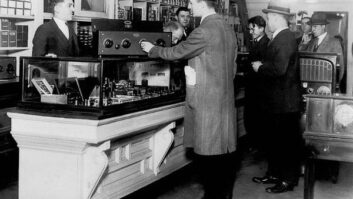A Closer Look at the New Assault on Indecency and Profanity at the FCC
This article discusses language that some readers may find offensive.
After a year of inaction regarding indecency and profanity, on a single day in March the FCC decided indecency and profanity complaints involving a record 51 different program episodes or advertisements and took a record $4.5 million in enforcement action. While the decisions involved television, they are worthy of close attention by radio broadcasters, particularly as they relate to how the commission approaches the use of expletives.
Despite the commission’s apparent intent to provide broadcasters with more meaningful guidance regarding indecency and profanity, the law in this area remains difficult to interpret and apply. Perhaps when the commission issues a number of new radio decisions as well, things will be clearer for radio broadcasters. To a significant extent, though, whether the commission finds a program to be indecent or profane depends on the subjective judgment of the commissioners, and this is not likely to change any time soon.
What Did the FCC Decide?
The commission issued three decisions.
First, it issued an omnibus order addressing 49 program episodes or advertisements. That order contained: (a) six Notices of Apparent Liability for Forfeiture (NALs) regarding nine program episodes totaling $350,000, two of which involved the “F-Word” or the “S-Word”; (b) decisions that 12 program episodes were indecent and profane for using the “F-Word” or the “S-Word” or variations thereof such as “bullshit” but not actionable because they occurred before the commission tightened the law regarding fleeting use of expletives in its 2004 Golden Globe decision; and (c) decisions that 28 other program episodes or advertisements were not indecent or profane.
Second, the commission proposed forfeitures totaling more than $3.6 million against CBS owned and operated and affiliated stations that broadcast an episode of “Without a Trace” that involved a depiction (with no nudity) of “teenage boys and girls participating in a sexual orgy” that the commission found to be “highly sexually charged and explicit.” The $3.6 million figure is higher than any other indecency enforcement action – or any broadcast enforcement action – in the history of the commission.
Third, the commission imposed a $550,000 forfeiture against CBS for its broadcast (on O&O stations) of the Super Bowl half-time show involving the brief exposure of Janet Jackson’s naked breast, including her nipple. This is the same amount proposed by the commission in its 2004 NAL.
What Standards Did the Commission Use?
Indecency. The commission continued to use the same general standard for deciding indecency cases. The commission first looks to whether the material depicts or describes sexual or excretory organs or activities. If the answer is yes, it then looks at whether the broadcast is “patently offensive as measured by contemporary community standards for the broadcast medium.”
In applying the second prong of its standard, the “full context” of the material is “critically important.” The commission looks at three “principal” factors in this regard: (1) the explicit or graphic nature of the material; (2) whether the material dwells on or repeats at length descriptions of sexual or excretory organs or activities; and (3) whether the material panders to, titillates or shocks the audience.
Profanity. In its 2004 Golden Globe decision, the commission redefined profanity as language “denoting certain of those personally reviling epithets naturally tending to provoke violent resentment or denoting language so grossly offensive to members of the public who actually hear it as to amount to a nuisance.”
The commission further refined that standard in its March 15 decisions. First, it explained that because broadcast programs will not likely provoke immediate violence, as a general matter it will only use the second part of the definition, whether the language is “so grossly offensive as to constitute a nuisance.” Second, the commission said that, in light of First Amendment implications, it will limit its regulation of profane language to “the universe of words that are sexual and excretory in nature or are derived from such terms.” Thus, the commission indicated that racial and religious epithets are not profane.
In its recent decisions, the commission created a new category for its analysis: words that are presumptively profane. This category includes “the most offensive words in the English language, the broadcast of which are likely to shock the viewer and disturb the peace of the home.”
The commission had previously said that broadcast of the phrase “fucking brilliant” by Bono in accepting an award was profane in context. It now held that use of the “F-Word” is presumptively profane. It also held that the use of the “S-Word,” including “bullshit,” is presumptively profane. Presumptively profane language will be found not to be profane only in “rare cases” where “it is demonstrably essential to the nature of an artistic or educational work or essential to informing viewers on a matter of public importance.” This exception will be applicable only in “unusual circumstances.”
How Did the Commission Treat Expletives?
Impermissible Expletives. As noted, the “F-Word” and “S-Word” and variations thereof such as “bullshit” are now presumptively profane. They are also likely to be found indecent in almost all contexts, including where used fleetingly and unintentionally.
Thus, the commission found that the following broadcasts were all indecent and profane: (1) the live broadcast on a morning news interview show of an interviewee’s single reference to someone as a “bullshitter”; (2) the live broadcast of a performer saying “fuck ’em” on an awards show, as well as the live broadcast of a performer saying “shit” and “fucking simple” on another awards show; (3) Detective Sipowitz’s single use of “bullshit” on episodes of “NYPD Blue”; (4) multiple uses of the “F-Word” and “S-Word” (and variations thereof) by interviewees on a PBS/Martin Scorsese documentary of the history of the blues; and (5) repeated use of the words “shit,” “bullshit” and “owl shit” in a feature movie.
The commission recognized one key exception: the movie “Saving Private Ryan.” It reiterated that the repeated use of the “F-Word” and the “S-Word” (and variations thereof) in “Saving Private Ryan” was not indecent or profane because the words are essential to the artistic integrity of the work. In contrast, the commission said with respect to the use of “bullshit” on “NYPD Blue” that “[w]hile we recognize that the expletives may have made some contribution to the authentic feel of the program, we believe that the purpose could have been fulfilled and all viewpoints expressed without the broadcast of expletives.”
Similar to its treatment of “NYPD Blue” and also in contrast to “Saving Private Ryan,” in connection with the PBS blues documentary, the commission said that “[w]hile we recognize here that the documentary had an educational purpose, we believe that purpose could have been fulfilled and all viewpoints expressed without the repeated broadcast of expletives.” The commission also relied (somewhat inexplicably) on the fact that not all of the expletives came from blues performers, but rather some were from a former label owner and record producer and some were from hip-hop artists.
The persuasiveness of these distinctions is not overwhelming and it will not be easy for broadcasters to figure out which uses of the “F-Word” or “S-Word” fall into the “Saving Private Ryan” exception. The safest course remains to avoid all uses of these words.
Permissible Expletives. The commission held that the following words or phrases were not indecent or profane in the contexts at issue (and also not presumptively profane): “poop,” “kick-ass,” “sex with a dog,” “singers that suck,” “a lot of crap,” “my ass,” “you suck,” “dick,” “dickhead,” “hell,” “damn,” “bitch,” “pissed off,” “up yours,” “ass,” “for Christ’s sake,” “kiss my ass,” “fire his ass,” “ass is huge,” “wiping his ass,” “sucked” and “sit their asses down.”
In reaching its decisions, the commission noted that “ass” was “used in a nonsexual sense to denigrate or insult the speaker or another character” and that “piss” was “used as part of a slang expression that means ‘angry.'” It is not clear why the same sort of analysis could not have been used in evaluating use of the word “bullshit” or calling someone a “bullshitter.”
The commission cautioned that in other (e.g., sexual) contexts, some of these words or phrases could be found to be indecent or profane.
No Free Pass for News and Public Affairs Programming
In describing its contextual approach to indecency, the commission said that it recognized the need for “caution” in dealing with complaints “implicating the editorial judgment of broadcast licensees in presenting news and public affairs programming … ”
In this regard, in finding that a “Today Show” brief broadcast of a penis in the context of a news report of a rescue attempt during a natural disaster was not indecent, the commission relied in part on the fact that a news broadcast was involved.
Nevertheless, despite the commission’s asserted sensitivity to the First Amendment issues involving news and public affairs programming, as noted above, it found that the single use of the word “bullshitter” by an interviewee on a live morning interview show was both indecent and profane. In addition, the commission repeatedly referred to its 2004 Young Broadcasting NAL and its finding that the brief broadcast of a penis was apparently indecent in the context of that news interview program.
Advertisements Not Exempt
Two of the programs found not to be indecent were advertisements. This serves as a useful reminder that broadcasters must review advertisements as well as other programming for content.
Use of Delay Devices
Where a station used a five-second delay, caught one expletive and missed another, the commission found the broadcast indecent and profane and said the station could have used a longer delay to make sure it caught all the expletives.
Live programming continues to be an area with significant exposure where licensees should consider the use of delay devices. One unanswered question is whether the commission could somehow find that even “bleeping” expletives is not enough. In this regard, the commission again found that pixilated nudity in a television show was indecent because it was clear that there was a naked female breast under the pixilation. By reason of analogy, could the commission conclude that bleeped expletives are indecent or profane because it is clear that the bleeped word was an impermissible expletive? Let’s hope the commission never goes that far.
Who Got Penalized and for How Much?
Willfulness. In the Super Bowl case, after a detailed factual analysis, the commission concluded that CBS’ broadcast of Janet Jackson’s breast was willful (and therefore could be the subject of an NAL) regardless of whether it intended to broadcast nudity. In this regard, the commission stressed that CBS consciously and deliberately broadcast the show, consciously and deliberately failed to take reasonable precautions to prevent the indecent material from airing and was responsible for the actions of Jackson, Justin Timberlake and Jackson’s choreographer because they were acting as CBS’s agents.
Affiliates The commission reiterated that it did not propose a forfeiture against network affiliates in the Super Bowl case because there was no evidence they played a role in the selection, planning or approval of the half-time show or that they could have reasonably anticipated that the half-time show would have included partial nudity. Where network programming was taped (“Without a Trace”), the commission held affiliates liable because they could have edited or declined the content prior to broadcast. This does not mean, however that affiliates will necessarily not be found liable for a live network broadcast, particularly if they could have anticipated potential problems. The reasoning of these cases could apply not only to radio networks, but also to syndicated radio programs.
Stations Not the Subject of a Complaint The commission changed course and held that it would no longer take enforcement action against stations not specifically named in a complaint, even if the commission knew they broadcast the same program.
Thus, for example, it did not include all CBS affiliates in the “Without a Trace” NAL, but rather only those mentioned in the complaints. On the one hand, this is a good thing because it could limit broadcasters’ potential exposure. On the other hand, it seems to leave the issue of who gets penalized largely in the hands of advocacy groups that generate complaints and could result in more complaints being filed against individual broadcasters.
Amount In general, the commission imposed or proposed the statutory maximum (previously $27,500 per violation, $32,500 per violation for broadcasts after Sept. 7, 2004). Indeed, the commission proposed or imposed an amount less than the statutory maximum in only two cases.
First, the commission proposed a forfeiture of $220,000 rather than the $385,000 maximum for 14 apparently indecent broadcasts of four Spanish language videos because it concluded that $385,000 would be excessive punishment in light of the fact that the licensee owned only two stations and had no prior indecency violations.
Second, the commission proposed a forfeiture of $15,000 rather than the $27,500 maximum for the PBS/Martin Scorsese documentary on the history of the blues because the indecent and profane language was contained in a documentary and the licensee may have been under the good-faith belief that the use of the expletives served a legitimate informational purpose, as well as the fact that the licensee runs a small, community station that airs college-level educational courses for most of the day.
Neither of these cases provides any hope that the commission will depart often from the statutory maximum. In effect, the statutory maximum has become the base forfeiture amount for indecency violations. The amounts may get even higher if Congress enacts pending indecency legislation.
What Comes Next?
Ever since the commission began its latest indecency crackdown in 2003, there have been predictions by some that ultimately the commission will get shot down in court on First Amendment grounds. But court review still may not be forthcoming in the immediate future.
The ripest case for judicial review is the Super Bowl/Janet Jackson forfeiture order. CBS has a choice under the law; it can pay within 30 days and appeal or it can do nothing and wait until the Department of Justice seeks to collect the forfeiture in district court. Under the Communications Act, any such collection action would be a trial de novo, with no weight given to the FCC’s findings and the burden of proof on the government.
The cases in which the commission issued NALs cannot get to court until after any forfeiture order. The cases in which the commission found broadcasts to be indecent or profane but proposed no forfeiture because the broadcasts were before the commission changed the law in Golden Globe could in theory be appealed now. Because there has not yet been an opportunity for those licensees to present their full legal defense to the commission, the more likely scenario, however, is that the licensees will first file petitions for reconsideration with the commission in order to ensure that they are not in the position of raising arguments in court that they have not first raised with the commission. NBC filed such a petition for reconsideration of the Golden Globe decision. (The commission has not yet acted on that petition, filed two years ago.)
While broadcasters challenging FCC indecency/profanity actions doubtlessly will raise constitutional issues, a reviewing court may never reach those issues in any particular case. A court would likely first analyze whether the material at issue falls within the statutory indecency and profanity standards and whether the FCC’s decision was arbitrary and capricious. If it ruled against the FCC on these grounds, it might well never address the constitutional issues.
FCC indecency and profanity enforcement is thus not likely to go away soon. After its recent group of television decisions, the commission may turn again to radio complaints soon. Whatever it does next, however, as its recent orders make clear, the standards are likely to remain murky and subjective for some time to come.












